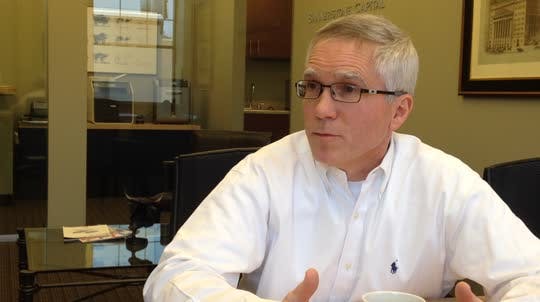Five years after the Great Recession, we find ourselves in a new place. Economists expect positive GDP growth in the United States, Europe, Japan and China — the first time in years that so many economies around the globe are all headed in a positive direction.
U.S. stock markets hit all-time highs in 2013. Oh, and the economy did not fall off the fiscal cliff.
Yet growth is slow and the U.S. unemployment rate remains unacceptably high at 7 percent.
The Federal Reserve tapped the brakes on its easy-money strategy on Dec. 18, saying it will slow or "taper'' the massive bond-buying program from $85 billion a month to $75 billion starting in January.
We asked nine of the Twin Cities' leading investment professionals to help the average investor navigate in the strengthening U.S. and global economy. Most members of the Star Tribune's Investor Roundtable had predicted that the taper would begin in early 2014. The Fed's initial move is relatively small and there could be a long way to go before the Fed ends its unprecedented policy.
Q: Last year at this time a major worry was the looming fiscal cliff. As we start 2014, what are the major worries to navigate today?
David Joy, chief market strategist, Ameriprise Financial: Well I think you have to start with the Fed, at least that's how I think of things. I'm not sure we've seen much reaction yet.
Carol Schleif, regional chief investment officer, Abbot Downing: The biggest thing right now is that the margin of error, the margin is less. [Stock] valuations are richer than they were a year ago. It's great, particularly as an equity investor, to be playing when fundamentals are strengthening but nobody believes it. Now everybody believes it, but the issue is where else do you go?
John De Clue, chief investment officer, The Private Client Reserve, U.S. Bancorp: I think the Fed's going to be watching the housing market more closely than almost anything else. Their attention has to be heightened by the back-off that we've seen and some of the slowdown in housing activity.
Erica Bergsland, director of research and trading, Advantus Capital Management: Well I think the Federal Reserve is very conscious of this uneven recovery, and I think that will cause them to maintain easy-money policy longer than people expect.
Russell Swansen, chief investment officer, Thrivent Financial for Lutherans: I agree with that. I think they're very concerned about employment, and I think that they didn't explain that well early this year.
Jim Paulsen, chief investment strategist, Wells Capital Management: The market makes two assumptions often around the Fed. One is that the Fed's in control of [the economy]; I don't think they are most of the time. Secondly is the idea that we'll have this nice, controlled, slow linear path out of the policy — which almost never happens historically. The way policy typically changes, almost all the time, is by panic.
Q: What would be the pace of the tapering?
Russell Swansen: Everybody looks at whoever the Fed chairman is as though they set policy themselves, and they don't. It's voted on by the committee, you have a lot of turnover on the committee and you have probably a greater mix of [inflation] hawks coming on. So the perception may be that there's less agreement on the committee than there has been in the past. I think there's a good question of whether [and] how effective Janet Yellen will be at communicating.
John DeClue: I'm going to take the brighter side of that, you asked about Yellen. … She is number one, the best predictor of economic events of anyone [on the committee]. We may not get as much communication as we would want but it will probably be more crisp.
Erica Bergsland: I don't think we're in a normal environment. I think what you're talking about with the taper is removing a distortion, not necessarily tightening … so I think the economy can absorb a taper … and I think the Fed will be very cautious in how they do it.
Elizabeth Lilly, portfolio manager, Westwood Teton Mighty Mites Fund and Gabelli Small Cap Fund: The tapering is not increasing interest rates, it's just pulling liquidity out of the system. That's a huge difference.
Doug Ramsey, chief investment officer, The Leuthold Group: Housing was an undisputed leader in the last cycle. Our view is that housing was, for a typical American, a far more pervasive bubble. Not as extreme maybe as the tech bubble, but it was a more pervasive bubble. And what we're seeing now is sort of a typical post-bubble aftermath.
Q: In 2013, investors in the markets had a lot thrown at them: the fiscal cliff, sequesters, debt-ceiling debates, the government shutdown, and I think there's more looming at the start of the year. Have investors learned to navigate these types of disruptions?
Jim Paulsen: A lot of what happened last year just has to do with the change in confidence that took place. Confidence went from postwar lows until about a year ago. Now it's at five-year highs. And that move to me was about finally giving up the "Armageddon ghost.'' We're not giving up the idea we have problems and challenges … but we no longer believe that every new thing is going to be the end the world.
Biff Robillard, president and co-founder of Bannerstone Capital Management: We've been talking as if [the world] was going to end for years in financial circles, and I think it can be a powerful condition when investors slowly realize they made it. They got through the hard part, and I think that's going to be a very important thing.
Elizabeth Lilly: Underlying all this, don't you think that the average investor still gets their 401(k) statement every quarter … and they're still like "OK, oh good. I'm back to even."
Q: With stock indexes at near-record levels, has the market gotten ahead of the economy?
Carol Schleif: The market is supposed to be ahead of the economy, that's why it's the leading economic indicator.
David Joy: I don't think stocks are in a bubble. I think your readers are probably hearing this every day, or at least the question. I don't think it's a bubble, I think valuations are elevated but justified where they are. But in order for them to go higher, the economy has to continue to improve.
Erica Bergsland: Clearly we're paying more for stocks today than a year ago. That means that prospective returns are probably going to be lower than they were a year ago. But saying that, interest rates are still very, very low and people have to put their money somewhere.
Jim Paulsen: I think our biggest risk is inflation. And if it happens and it gets out of control, we have to prematurely shut down the cycle, early. But if we keep that original control, 4 percent or less, we're probably not even halfway through this recovery in the economy or the markets. And the reason is because of the shock that hit all the players.
Q: The end of the year is a good time for everybody to look at their portfolios and to rebalance, especially given the last year. Which areas and what sectors are looking most attractive?
Russell Swansen: I would say we are favoring large-company stocks over small-company stocks because of the valuation comparisons. We're favoring large European multinationals, which in many ways look a lot like domestic companies. Nestlé for example, many people would probably be surprised that that's not a U.S. company. The valuations there are lower than on U.S. stocks.
Elizabeth Lilly: I would say health care. A trillion dollars is going to be spent on Obamacare over the next 10 years trying to comply. So within health care, you've got hospitals, insurance companies, which are going to be big beneficiaries. I think we're in the midst of a huge property and plant equipment spending cycle that is going to benefit this country because we've underspent. And aerospace, a lot of aerospace suppliers are going to benefit from what's going on with Boeing and Airbus. And then I would say energy.
Jim Paulsen: I like the emerging markets. They've been so terrible, no one likes them. But they have had a good year. I like the industrial sector. The problem is that the industrial stocks have done so well, which makes you a little leery.
Doug Ramsey: [Technology] is our No. 1-rated sector. … Those are kind of odd bedfellows to have cyclical growth [stocks] and technology at the top and then health care. I think industrials look interesting.
Biff Robillard: I think that individual investors would be wise to remember that the market does present buying opportunities, it does correct. But we're concerned that there's a disappointment coming and we will fulfill the age-old proverb that a bull market goes up with nobody on board and a bear market comes down with everybody on board.
Q: What is the impact of potential higher interest rates when you're choosing between equities and bonds and what that would potentially mean for next year.
Erica Bergsland: We think the economy will be strong enough that rates probably will go up a bit next year, which means that returns on bonds could be lower than that already-low rate. So I think, as Russ and others have pointed out, it's a clear buying opportunity on stocks. Stocks on their own aren't clearly cheap, but it's probably a better deal than bonds over both the short and the intermediate term.
Patrick Kennedy • 612-673-7926
Abu Ghraib military contractor warned bosses of abuses 2 weeks after arriving, testimony reveals
Biden vows to shield US steel industry by blocking Japanese merger and seeking new Chinese tariffs
Georgia's parliament votes to approve so-called 'Russian law' targeting media in first reading
Jill Biden says an agreement to let federal employee military spouses work from overseas is overdue

